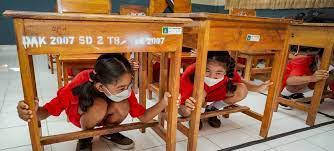
In their red school uniforms, with backpacks on their heads to protect from falling debris, More than 200 students and teachers from Tanjong Benoa Elementary School on the Indonesian island of Bali, filed calmly up three flights of stairs to the rooftop of a hotel, close to their classrooms.
Thankfully, the alarm that prompted them to evacuate, was just a practice drill, but by following the planned evacuation route, students said they felt confident they could respond quickly and calmly in any real emergency.
“I will tell my parents, my family, and I will try my best to keep them safe,” fourth-grade student, Ni Putu Anika Desintha Pradnyan Dewi, told UN Deputy Secretary-General Amina Mohammed after the earthquake and tsunami drill, part of a broader UN Development Programme (UNDP)-supported tsunami evacuation plan for Tanjong Benoa village.
Telling the world
The Deputy Secretary-General, who is in Bali ahead of the Stakeholder Forum of the seventh Global Platform for Disaster Risk Reduction (GPDRR) on Wednesday, in turn promised that when she got back to UN Headquarters, she would “tell students in New York City, about the leadership Balinese students demonstrated, during the drill”, and how resilient students are overall in Bali.
Building the resilience of communities and nations is a central focus of the GPDRR, the world's foremost gathering on reducing disaster risk.
For host nation Indonesia, which straddles the volatile Pacific Rim of Fire with its shifting tectonic plates, resilience is a national imperative.
Indonesia recorded more than 3,000 disasters across its 17,000 islands in 2021, the equivalent of eight disasters per day. Earthquake and tsunamis pose a particularly grave threat to Indonesia.
In 2004, the Indian Ocean tsunami killed some 230,000 people, most of them in the country’s western Aceh province. And as recently as 2018, the Palu earthquake and tsunami killed more than 4,300 in Sulawesi.
But the COVID-19 crisis has dwarfed those disasters. Its socioeconomic fallout disproportionally disadvantages young people, women and girls; as well as indigenous people and other vulnerable populations most of risk of being left behind.
Source: UN News
https://news.un.org/en/story/2022/05/1118942
 FR
FR EN
EN AR
AR








